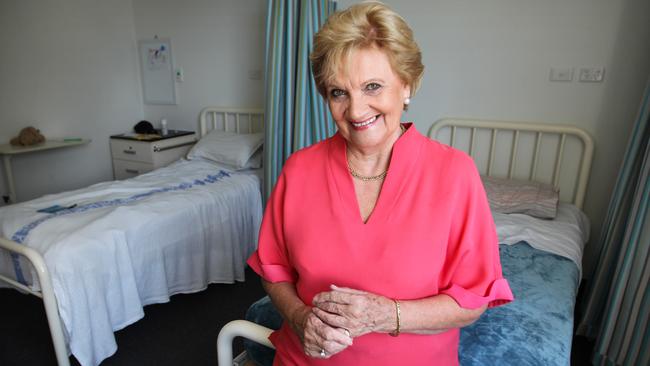Addiction formed basis for Lorraine Wood’s life’s work
Lorraine Wood understands the suffering caused by addiction and has spent much of her life trying to ameliorate it.

Awareness of depression and anxiety is growing at a rate of knots, says Lorraine Wood, who credits this to people talking about it and accepting their own mental health condition.
Wood, 78, owns South Pacific Private on Sydney’s northern beaches, a treatment centre for people with addictions and mood disorders.
“The need for help is ever growing,” she says. “By 2020, depression is going to be the biggest diagnosed disease in the world, and that’s what most people come in for.
“People are talking about it now when they didn’t use to. It was our culture not to talk about it and keep a stiff upper lip, and the more you push it down, it seeps out sideways.”
The statistics are stark — Beyondblue figures show about one million Australian adults suffer from depression in any given year and more than two million have anxiety. The most common mental illnesses are depression, anxiety and substance use disorder.
The US-based National Institute of Mental Health estimates that 350 million people worldwide suffer from depression and more than 16 million Americans suffer from the disorder.
The need for treatment centres and services for people with mental health disorders and addictions probably will grow during the next two decades, particularly as the National Disability Insurance Scheme ramps up, and there will be jobs growth in the health sector.
Wood sees her psychiatric treatment facility, which she has run since founding the centre with her husband Bill in 1993, as ideally placed to help people.
Last year SPP spent $10 million to expand the centre from 37 beds to 64.
The New Zealand-born Australian has first-hand experience of mental health and substance abuse, after marrying a recovering alcoholic with financial risk addictions and having grown up with alcoholic parents.
“Addictions run in the family and sometimes it skips a generation; 10 to 15 per cent of people have the addictive genes,” she says. “Both my parents were alcoholics. The gene came out in me and the depression and anxiety came out in my children. My husband Bill came from a long line of alcoholics. Sometimes it skips a generation, and the alcoholism did with me.”
Both Wood and her husband had been married before they met in 1971, while still living in New Zealand, and the pair moved to Australia soon after with their combined brood of seven girls. They had another daughter together.
She says her husband was a dry drunk and went to Alcoholics Anonymous for eight years, while her moods deepened and she suffered from depression and became suicidal.
The pair looked for help in Australia and found little support before attending a treatment centre in the US called The Meadows.
They were impressed with the cognitive therapy offered and, with Bill’s entrepreneurial bent, they decided to establish a similar facility in Sydney using The Meadows’ programs.
The US owners trained Australians and the day facility became an accredited private psychiatric facility offering three-week treatment programs. It now employs 100 doctors, therapists, psychiatrists and psychologists, has four-day programs for family members so they can better understand addictions and learn how to help, and has a halfway house for people recovering from addictions and emotional disorders.
“One-third of patients get well, one-third keep coming back and recovering, and one-third go out and die 10 years before they should,” Wood says.
“They can’t change unless they really want it. Sometimes you have to come back and then you get it; some people never do. My mum never did; she had treatments and was only OK for about two years.”
Despite drying out, Wood says her husband also battled financial risk addiction and kept buying real estate and doing larger deals.
When he died from cancer in 2000, he left her with an $8m debt. It took Wood four years to sell off assets, including their successful real estate agency Blunts, so she could keep the hospital.
Wood has published a book on her experiences, lessons from her 23-year business career and her life dealing with addictions and therapy called Love & Addiction.
One of those lessons was to be in control of her own money, as she had not been before Bill died, and seek out good business advisers and managers while watching for sharks who might want to buy her business.
“When he died I thought all I needed was a good manager, but I did a lot of work, made some redundancies and was very careful about who I employed,” she says.
“I now come in three to four days a week and my job is to inspire and hold people accountable. The key is to hold people accountable and keep good staff. You might have had people there a very long time, and they get tired and it’s not their business, but you’ve got to make the tough decisions. If you want your business to be vibrant, you need vibrant people.”
Along with finding good advisers, she warns people to avoid partnerships because she thinks many do not work.
“Bite the bullet and do it on your own. For women, if you’re in a company, you have to put so much energy in to break the glass ceiling, but if it’s your own business you can’t help but have success if you work hard.”
She also encourages people to follow their passions.
“My passion is recovery and I love talking to the patients. When I come here time stands still.”
For now, other than working several days a week, Wood’s plan is to find a partner.
“I’m looking for a husband, I’ve been single for 15 years now. I can’t tell you how terrible being a widow is — you’re used to being married and it’s like losing an arm. I’ll have to put some energy into it.”


